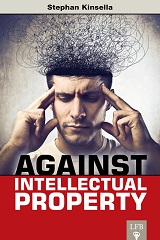Den stora debatten mellan kapitalism och socialism lider av en brist på klarhet kring definitioner. Det är därför som, när Walter Block föreläste hos Mises Brasilien förra veckan, var mycket noga med att skilja mellan kumpankapitalism och äkta kapitalism. Och det är därför som frågan omedelbart kom på tal när jag blev intervjuad: Vad exakt menar du med ”kapitalism”?
Varje dag kan vi till exempel läsa om hur den Europeiska ekonomiska röran är ”kapitalismens kris”. Ursäkta? Det har gått mer än ett sekel sedan staterna lät dessa ekonomier växa av sig själva utan att klubba ned dem med regler, beskattning, plundra allmänheten, nedskräpa finansiella system med falska pengar, kartellisera producenterna, skyffla ut sociala förmåner, finansiera gigantiska offentliga arbeten och liknande.
Vissa förespråkare av marknadsfrihet menar att begreppet ”kapitalism” bör kastas ut för all framtid eftersom det orsakar förvirring. Folk kanske tror att du föredrar att använda staten för att backa upp kapital mot arbetskraft med hjälp av allmän policy, på ett sätt som stöder framstående producenter framför konsumenter eller driver på politiska prioriteringar som främjar företag över arbetskraft.
Om ett begrepp belyser en idé med noggrannhet är det bra. Om det orsakar förvirring så ändra på det. Språket utvecklas hela tiden. Ingen särskild ordning av bokstäver inbäddar en oföränderlig mening. Och vad som står på spel i denna debatt om marknadsfrihet (eller kapitalism eller laissez faire eller den fria marknaden) är av djupgående betydelse.
Det är substansen och inte ord som vi bör bry oss om. Civilisationen hänger verkligen i balans.
Här är fem centrala inslag till denna idé om marknadsfrihet eller vad du vill kalla det. Det är min korta sammanfattning av den klassiska liberala visionen av det fria samhället och dess funktion, vilken inte bara handlar om ekonomi utan hela livet självt.
Vilja. Marknader handlar om människans val på alla nivåer av samhället. Dessa val omfattar alla sektorer och varje individ. Du kan välja ditt arbete. Ingen kan tvinga dig. Samtidigt kan du inte tvinga dig på någon arbetsgivare. Ingen kan tvinga dig att köpa något, men inte heller kan du tvinga någon att sälja till dig.
Rätten att välja erkänner den oändliga mångfalden inom den mänskliga familjen (Medan den statliga politiken måste anta att människor är utbytbara enheter). Vissa människor känner en kallelse till att leva ett liv av bön och kontemplation i en gemenskap med religiöst troende. Andra har en talang för att hantera högrisk-hedgefonder. Andra föredrar konst eller redovisning, eller något annat yrke eller kall som du kan tänka dig. Vad det än är kan du göra det förutsatt att det eftersträvas på ett fredligt sätt.
Du gör val, men i dina relationer med andra är ”avtal” mottot. Detta innebär maximal frihet för alla i samhället. Det innebär också en maximal roll för vad som kallas ”de medborgerliga rättigheterna.” Det innebär yttrandefrihet, frihet att konsumera, frihet att köpa och sälja, frihet att annonsera och så vidare. Ingen uppsättning av val är rättsligt skyddade över andra.
Ägande. I en värld av oändligt överflöd skulle det inte finnas något behov av ägande. Men så länge vi lever i den materiella världen kommer det att finnas potentiella konflikter om knappa resurser. Dessa konflikter kan lösas genom att slåss över saker eller genom erkännande av äganderätt. Om vi föredrar lugn över krig, vilja över våldet, produktivitet snarare än fattigdom, behöver alla knappa resurser – utan undantag – privata ägare.
Alla kan använda hans eller hennes egendom på vilket som helst fredligt sätt. Det finns inga mandat för ackumulation eller begränsningar för ackumulering. Samhället kan inte förklara vem som helst som för rik eller förbjuda frivillig estetik genom att förklara vem som helst för fattig. Inte vid något tillfälle kan vem som helst ta vad är ditt utan din tillåtelse. Du kan tilldela äganderättigheter till arvtagare efter att du dör.
Socialismen är verkligen inte ett alternativ i den materiella världen. Det kan inte finnas något kollektivt ägande av någonting som är materiellt sällsynt. En eller annan fraktion kommer att hävda sin kontroll i samhällets namn. Fraktionen kommer oundvikligen vara den mest kraftfulla i samhället – det vill säga staten. Det är därför som alla försök att skapa socialism i sällsynta varor eller tjänster utvecklas till totalitära system.
Samarbete. Viljan och ägande beviljar rätten till någon att leva i ett tillstånd av ren självförsörjning. Å andra sidan kommer du inte långt med det. Du kommer att vara fattig och ditt liv kommer att bli kort. Människor behöver människor för att få ett bättre liv. Vi bedriver handel till ömsesidig förbättring. Vi samarbetar i arbetet. Vi utvecklar varje form av samarbete med varandra: kommersiella, familjära och religiösa. För oss alla förbättras våra liv genom vår förmåga att samarbeta i någon form med andra människor.
I ett samhälle baserat på vilja, ägande och samarbete, utvecklas nätverk av mänskligt samarbete över tid och rum för att skapa komplexiteterna hos den sociala och ekonomiska ordningen. Ingen är befälhavare över någon annan. Om vi vill lyckas i livet kommer vi att värdera tjänandet av varandra på de bästa sätt vi kan. Företag tjänar konsumenterna. Chefer tjänar anställda precis som anställda tjänar företag.
Ett fritt samhälle är ett samhälle av utökad vänskap. Det är ett samhälle baserat på service och välvilja.
Lärande. Ingen föds in i denna värld vetandes mycket om någonting. Vi lär oss från våra föräldrar och lärare, men ännu viktigare, vi lär oss av de oändliga bitar av information som kommer till oss varje ögonblick av dagen alla under hela våra liv. Vi observerar framgång och misslyckande hos andra och vi är fria att acceptera eller förkasta dessa erfarenheter som vi vill. I ett fritt samhälle är vi fria att efterlikna andra, ackumulera och tillämpa visdom, läsa och absorbera idéer och extrahera information från vilken källa som helst och anpassa det för eget bruk.
All information vi stöter på i våra liv, förutsatt att de erhålls utan tvång, är en fri vara som inte omfattas av gränserna för brist, eftersom den är oändligt kopierbar. Du kan äga den och jag kan äga den och alla kan äga utan någon gräns.
Här finner vi den ”socialistiska” sidan av det kapitalistiska systemet. Recepten för framgång och misslyckande finns överallt och tillgängliga för att ta. Det är därför själva begreppet ”intellektuell egendom” är skadligt för frihet: Det innebär alltid att tvinga människor och därmed bryta mot principerna fri vilja, äkta ägande och samarbete.
Konkurrens. När människor tänker på kapitalismen är konkurrensen kanske den första idén som dom kommer att tänka på. Men idén är allmänt missförstådd. Det betyder inte att det måste finnas flera leverantörer av varje vara eller tjänst, eller att det måste finnas ett visst antal producenter av någonting. Det betyder bara att det inte bör finnas några rättsliga (tvingande) gränser för hur vi tillåts att tjäna varandra. Och det finns verkligen oändliga sätt varpå detta kan ske.
I idrott har konkurrensen ett mål: att vinna. Tävlingen har också ett mål i marknadsekonomin: service till konsumenten genom ständigt ökande grad av förträfflighet. Denna förträfflighet kan komma från tillhandahållandet av bättre och billigare produkter eller tjänster, eller genom att erbjuda nya innovationer som svarar mot människors behov på ett bättre sätt än befintliga produkter eller tjänster. Det betyder inte att “döda” konkurrensen, utan det innebär att sträva efter att göra ett bättre jobb än någon annan.
Varje tävlingsinriktad handling är en risk, ett språng in i en okänd framtid. Om bedömningen var rätt eller fel ratificeras av systemet för vinst och förlust, signaler som fungerar som objektiva mått för huruvida resurserna används klokt eller inte. Dessa signaler kommer från priser som faststäls fritt på marknaden – det vill säga att de återspeglar tidigare överenskommelser mellan väljande individer.
Till skillnad från idrott så finns det ingen slutpunkt för tävlingen. Det är en process som aldrig tar slut. Det finns ingen slutgiltig vinnare; det pågår en omväxling av förträfflighet mellan spelarna. Och vem som helst kan delta i spelet förutsatt att dom gör det fredligt.
Sammanfattningsvis, här har vi det: vilja, ägande, samarbete, lärande och konkurrens. Det är kapitalismen som jag förstår den, som den beskrivs i den klassiska liberala traditionen som förbättrats av de Österrikiska sociala teoretikerna på 1900-talet. Det är inte ett system lika mycket som en social miljö för alla tider och platser som gynnar mänskligt blomstrande.
Det är inte svårt att urskilja mitt politiska synsätt: Om det passar ihop med dessa grundpelare så är jag för det; om inte så är jag emot det. Nu säger du till mig: “Är krisen i Europa eller USA:s egna kris verkligen en kapitalismens kris?” Tvärtom. En äkta kapitalism är svaret på de största problemen i världen idag.
Följande artikel är en översättning och omarbetad version av Jeffrey Tuckers ”Five Pillars of Economic Freedom” från den 7:e maj 2012.








































![[Most Recent Quotes from www.kitco.com]](https://i0.wp.com/www.kitconet.com/charts/metals/gold/t24_au_en_usoz_2.gif)
![[Most Recent Quotes from www.kitco.com]](https://i0.wp.com/www.kitconet.com/charts/metals/silver/t24_ag_en_usoz_2.gif)
![[Most Recent Quotes from www.kitco.com]](https://i0.wp.com/www.kitconet.com/charts/metals/platinum/t24_pt_en_usoz_2.gif)
![[Most Recent Quotes from www.kitco.com]](https://i0.wp.com/www.kitconet.com/charts/metals/palladium/t24_pd_en_usoz_2.gif)
![[Most Recent Quotes from www.kitco.com]](https://i0.wp.com/www.kitconet.com/charts/metals/base/copper-d.gif)
![[Most Recent Quotes from www.kitco.com]](https://i0.wp.com/www.kitconet.com/charts/metals/base/nickel-d.gif)
![[Most Recent Quotes from www.kitco.com]](https://i0.wp.com/www.kitconet.com/charts/metals/base/aluminum-d.gif)
![[Most Recent Quotes from www.kitco.com]](https://i0.wp.com/www.kitconet.com/charts/metals/base/zinc-d.gif)
![[Most Recent Quotes from www.kitco.com]](https://i0.wp.com/www.kitconet.com/charts/metals/base/lead-d.gif)


Senaste kommentarer